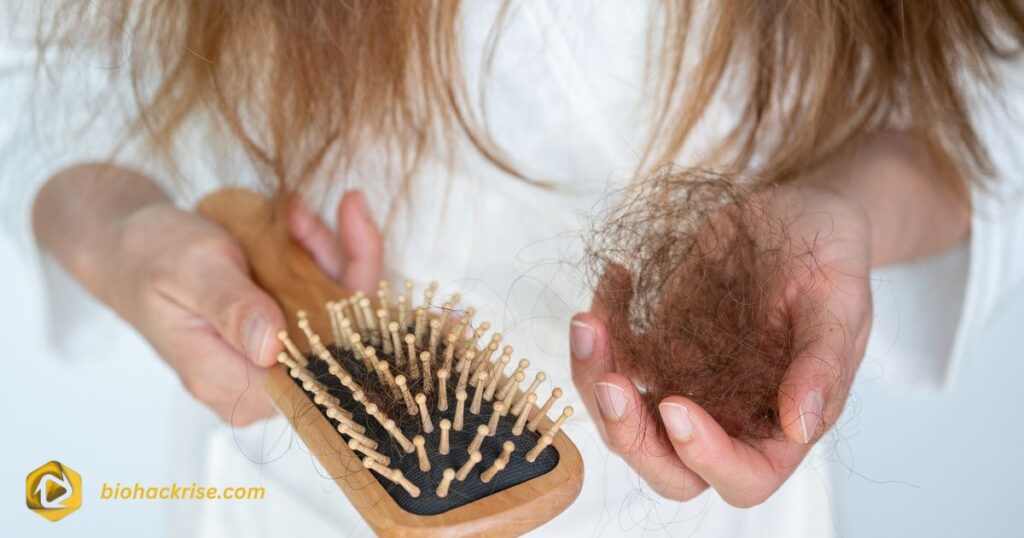How Much Does Hair Weigh? Complete Scientific Guide
Ever wondered how much your hair actually weighs? You’re not alone! It’s one of those quirky questions that pop into your mind when you’re brushing your hair, noticing your hair fall, or even thinking about cutting it all off. The truth is, while hair looks and feels lightweight, it actually has measurable mass and when you add it all up, the numbers might surprise you.
In this ultimate guide, we’ll dive into everything you need to know about hair weight from a single strand to a full head of hair. We’ll also explore how factors like texture, length, and moisture affect hair weight, along with some fascinating hair facts you probably didn’t know.
Understanding the Basics: What Is Hair Made Of?
Before we calculate how much hair weighs, let’s understand what it’s made of. Human hair is composed mainly of keratin, a strong fibrous protein that also makes up your nails and the outer layer of your skin. Each hair strand has three layers:
- Cuticle – the outer protective layer that gives hair its shine.
- Cortex – the thickest layer, which determines hair color, strength and texture.
- Medulla – the innermost layer, present mainly in thick hair.
Because keratin is a dense protein-based structure, every strand of hair has a tiny bit of weight even if it’s almost impossible to feel individually. Multiply that by the thousands of hairs on your head, and suddenly, it adds up!
So, How Much Does a Single Strand of Hair Weigh?
Let’s start small. On average, a single human hair strand weighs about 0.62 milligrams (or 0.000022 ounces). This, of course, depends on the hair’s diameter and moisture content.
Here’s a quick breakdown:
| Hair Type | Average Diameter (mm) | Average Weight (mg per strand) |
| Fine hair | 0.04 mm | 0.4 mg |
| Medium hair | 0.06 mm | 0.62 mg |
| Thick hair | 0.08 mm | 0.8 mg |
So, while each strand might seem weightless, it’s not quite zero and when multiplied by tens of thousands, it becomes surprisingly measurable.
How Many Hairs Are on the Human Head?
The number of hairs on your head depends largely on genetics and hair color. Here’s an estimate by natural hair color:
| Hair Color | Average Number of Hairs |
| Blonde | 150,000 |
| Brown | 110,000 |
| Black | 100,000 |
| Red | 90,000 |
When you combine this with the weight of individual strands, you can get an approximate total hair weight for a full head.
Calculating the Total Weight of Hair on Your Head
Let’s do a quick calculation using averages:
- Average strand weight: 0.62 mg
- Average number of hairs: 100,000
0.62 mg x 100,000 = 62,000 mg, which equals 62 grams or about 0.14 pounds.
That means your entire head of hair weighs roughly 50–120 grams (0.11–0.26 pounds) depending on hair density and thickness. That’s about the same as:
- 1 medium-sized apple
- A deck of playing cards
- Two AA batteries
Not as heavy as you thought, right? But that’s just dry hair. Things change drastically when it’s wet.
Wet Hair vs. Dry Hair Weight: The Big Difference

Have you ever noticed how heavy your hair feels after a shower? That’s because wet hair can hold up to 30% of its own weight in water. The outer cuticle layer absorbs moisture, and the water molecules cling to the hair shaft.
So, if your dry hair weighs 100 grams, it could weigh up to 130 grams when wet. That’s why long, thick hair can feel heavy after washing or swimmingit’s literally carrying extra water weight.
Does Hair Length Affect Weight?
Absolutely! Hair length plays one of the biggest roles in determining total weight.
Here’s a rough idea of how length correlates with overall hair weight:
| Hair Length | Estimated Weight |
| Short (2–4 inches) | 30–50 grams |
| Medium (6–12 inches) | 50–80 grams |
| Long (14–24 inches) | 100–150 grams |
| Extra Long (30+ inches) | 150–250 grams or more |
Keep in mind this assumes average hair thickness and density. Someone with thick, coarse, curly hair will have more mass than someone with fine, straight strands of the same length.
RELATED POST: Kyle Baugher Net Worth Biography, Career and Financial Success
Does Hair Type and Texture Influence Hair Weight?
Definitely. The structure of your hair whether it’s curly, wavy or straight affects how densely it grows and how heavy it feels.
- Straight Hair: Lies flat, reflecting more light and appearing denser. Usually feels lighter.
- Wavy Hair: Holds more volume and can feel slightly heavier.
- Curly or Coily Hair: Has a spring-like pattern that adds bulk and traps more air, often making it feel thicker and heavier even if the actual weight is similar.
So, while hair texture doesn’t drastically change the total mass, it influences the perceived weight and fullness.
Does Hair Color Impact Hair Weight?
Surprisingly, yes though slightly. Hair color is linked to the number of follicles and strand thickness:
- Blondes tend to have more hairs but each strand is thinner and lighter.
- Brunettes and Black-haired individuals have fewer but thicker, heavier strands.
- Redheads have the fewest hairs but each strand is coarse, giving it more weight per strand.
In short, the color indirectly affects total weight through density and strand thickness.
How Hair Density Influences Total Weight?
Hair density refers to how many strands grow per square inch of scalp. Most people have between 800 and 1,200 hairs per square inch. A higher density means more strands and therefore, more overall hair weight.
If two people have identical hair lengths, the one with denser hair will have a noticeably heavier mane even if each strand weighs the same.
How Much Does Cut Hair Weigh at the Salon?

If you’ve ever chopped off a ponytail or donated your hair, you might be curious about how much it weighed. On average:
- A 10-inch ponytail can weigh between 80–150 grams.
- A 20-inch ponytail might weigh 200–300 grams or more, depending on thickness.
That’s why wigs made from human hair often list weights in grams because hair extensions and wigs are sold based on this exact measurement.
Fun Comparisons: What Else Weighs the Same as Hair?
Just for fun, let’s see how hair weight stacks up against everyday objects:
| Object | Approx. Weight | Equivalent to Hair |
| A deck of cards | 100 g | Full head of long hair |
| A small apple | 150 g | Thick, long hair |
| A bar of soap | 120 g | Shoulder-length medium hair |
| A slice of bread | 30 g | Short haircut |
Crazy, right? It’s wild to think that all that fluff and flow on your head weighs about the same as a snack or a battery pack.
Does Shaving or Cutting Hair Affect Your Weight?
Here’s a fun myth-buster: Cutting your hair doesn’t make you lighter in any meaningful way.
Even if you chop off 100 grams of hair, that’s only 0.22 pounds barely noticeable on a scale. The real difference you’ll feel is psychological (and maybe aerodynamic if you’re a swimmer or cyclist!).
However, cutting off long hair can feel lighter because it removes weight from your scalp, making your head feel freer and your neck less strained. That’s why people often describe post-haircut sensations as “liberating” or “weight off their shoulders” because, in a sense, it literally is!
Does Hair Weight Differ Between Genders?
While both men and women have similar hair structure, there are some subtle differences:
- Women usually have longer hair, leading to a higher total hair weight.
- Men tend to have shorter styles but often thicker individual strands.
- Hormones like testosterone can influence hair thickness, especially in areas like beards or body hair.
So, while the average male head may have a slightly lower total hair weight due to shorter length, per-strand weight and density can still be high.
How Hair Extensions and Wigs Are Measured by Weight
In the beauty industry, hair extensions, wigs and weaves are sold based on grams or ounces. This helps stylists and customers estimate how much volume they’ll get.
Here’s a quick guide:
| Hair Type | Average Weight |
| Short wig (8–10 inches) | 80–100 g |
| Medium wig (12–16 inches) | 120–160 g |
| Long wig (18–24 inches) | 180–250 g |
| Full lace wig (thick density) | 250–350 g |
If you’ve ever bought hair bundles, you’ve probably seen listings like “3 bundles = 300 grams.” That’s because each bundle typically weighs around 100 grams about the same as a full head of medium-length hair.
Does Damaged or Healthy Hair Weigh More?
Surprisingly, healthy hair tends to weigh slightly more than damaged hair because it retains moisture better and has a smoother, denser cuticle layer.
Damaged or bleached hair becomes porous and lightweight as it loses keratin and moisture. That’s why people with overly processed hair often find their locks feeling limp or thin there’s literally less material per strand.
Moisturized, protein-rich hair holds more water and nutrients, giving it a fuller and slightly heavier feel.
Environmental Factors That Can Change Hair Weight

Believe it or not, your surroundings can affect how heavy your hair feels:
- Humidity: Hair absorbs water from the air, adding noticeable weight and frizz.
- Pollution and dust: Can coat the hair, slightly increasing its mass.
- Products and oils: Leave residues that can add temporary weight to strands.
- Temperature: Cold, dry climates make hair lighter as it loses moisture; humid heat does the opposite.
So yes, on a humid summer day, your hair might actually weigh more than it does in the winter!
The Weight of Hair in Science and Myth
Hair has fascinated scientists and storytellers alike for centuries.
- In forensic science, hair samples are weighed, analyzed, and tested for toxins or drugs.
- In mythology, hair often symbolizes strength or identity think of Samson’s legendary locks.
- In modern research, scientists even explore how hair’s tensile strength (it can hold up to 100 grams per strand before breaking!) compares to steel wire of the same thickness.
That means the combined strength of all your hair could technically lift an adult human if it were somehow harnessed together—a crazy but true fact!
How to Measure Your Own Hair Weight?
If you’re curious to measure your hair weight at home, here’s a simple DIY method:
- Gather your hair (or collect freshly fallen strands from brushing).
- Use a precise digital scale kitchen or jewelry scales work best.
- Weigh the hair when it’s dry to avoid water weight distortion.
- If calculating total head weight:
It won’t be exact, but it gives a fun, science-y approximation!
Hair Weight and Hair Loss: Does Losing Hair Make You Lighter?
Technically, yes but not enough to notice! Even if someone loses half their hair, that’s only about 30–50 grams.
However, the emotional and visual difference feels much larger. People experiencing thinning hair often perceive a “lighter” head, but scales won’t register it.
Still, monitoring your hair’s volume and texture can provide clues about your health, diet, and hormonal balance factors that can indirectly affect both hair mass and quality.
Does Shaving the Body or Beard Affect Weight?
For men wondering if shaving their beard could shave off some body weight sorry, no. Even a thick beard only weighs 20–30 grams at most.
Body hair is even lighter. The fine, vellus hair covering your body contributes less than a few grams in total. So, grooming habits don’t really make a measurable difference on the scale, but they sure can on confidence!
Quick Recap: Key Takeaways About Hair Weight
Let’s sum up everything we’ve covered so far:
- A single strand of hair weighs around 0.62 mg.
- The average human has 90,000–150,000 hairs.
- A full head of hair weighs 50–120 grams dry.
- Wet hair can weigh 30% more.
- Hair length, density, and texture greatly affect total mass.
- Environmental factors and moisture can temporarily increase hair weight.
- Cutting your hair doesn’t noticeably change your body weight but it feels lighter!
FAQ’s
Does hair grow heavier as it gets longer?
Yes! The longer your hair, the more mass it has. Each additional inch adds a few grams to your overall hair weight.
How much does a full head of wet hair weigh?
Wet hair can weigh 20–30% more than dry hair, averaging between 70–150 grams depending on length and thickness.
Can hair products make hair heavier?
Absolutely. Oils, sprays, and conditioners can add temporary weight, especially if buildup occurs over time.
Is hair weight used in forensic science?
Yes. Scientists use hair weight and composition to analyze toxins, isotopes, and environmental exposure in forensic studies.
Does shaving your head make you lose weight?
Technically yes but only a few grams. The scale difference is so small it’s practically unnoticeable.
Conclusion
So, how much does hair weigh? In short a lot more than you’d expect, but not enough to change your bathroom scale!
Hair is a fascinating material, both biologically and physically. It’s strong, flexible, and surprisingly dense for something that feels feather-light. Whether you’re rocking a buzz cut, waist-length curls, or a colorful wig, remember your hair might be light, but it carries a lot of character, science and personality!
So next time you run your fingers through your locks or toss your hair in the mirror, know that there’s real weight behind that beauty literally and figuratively.




